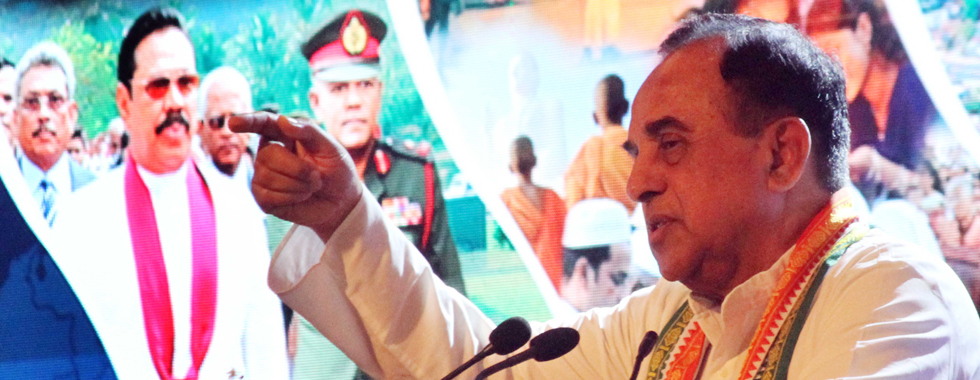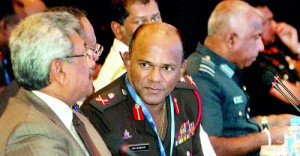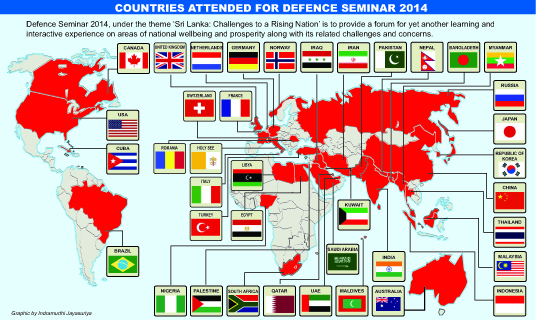News
India for non-interference , China moots Lanka’s geopolitical importance
The final day of Defence Seminar -2014 coincided with the 70th birth anniversary of former Indian Prime Minister Rajiv Gandhi, who was assassinated by the LTTE in Sriperumbudur in South India in May 1991. It was not a date that many remembered until Dr. Subramanian Swamy, a senior member of the ruling Bharathiya Janatha Party (BJP) who spoke during the concluding session of the three-day seminar, reminded the delegates it would have been the 70th birthday of the former Indian Prime Minister, a personal friend of his. It was also a reminder that the Defence Seminar held annually since 2011, is only possible because of the Sri Lanka armed forces’ defeat of the LTTE in May 2009, exactly 24 years after Mr Gandhi’s killing.

Highlight of the seminar: Dr. Subramanian Swamy’ s speech
The theme of this year’s seminar was ‘Sri Lanka – Challenges to a Rising Nation’, and during the three-day event, military personnel and defence specialists from 43 countries met in Colombo, where different perspectives were heard from delegates from various nations.
However, Dr. Swamy’s speech was the highlight of the seminar, one which many looked forward to. It was the second time that Dr. Swamy was addressing the Seminar, the difference this time being that, instead of the Congress Party being in power at the Centre in New Delhi, a BJP government was in office. Hence, Dr Swamy reiterated the position taken by the new Indian government led by Prime Minister Narendra Modi to strengthen relations with Sri Lanka and not allow regional interests to sway its foreign policy. “India’s foreign policy is very clear and will not agree to any foreign power interfering in Sri Lanka’s internal matters, nor will it intervene in any such regional context either,” he said, adding that, the new government will not allow regional powers around India to dictate its foreign policy.
He was also critical of the Tami leaders in Sri Lanka, saying they are a “total failure”. “When President Mahinda Rajapaksa asked the Chief Minister of the Northern Province to accompany him for Mr Modi’s swearing-in as Prime Minister, he has turned down. He is the President of Sri Lanka, not of a foreign land, so why was his invitation rejected?” he asked.
The veteran Indian politician also advised the Tamil community to learn to vote strategically, not emotionally. “If you don’t stop thinking on communal lines, you will not achieve any of your objectives. If the majority gets together when they vote, then it is the

Defence Secretary Gotabaya Rajapaksa with SL Army Commander Daya Ratnayake. Pix by Indika Handuwala
minorities who lose out. It is also bad for democracy,” he said.
The seminar began on Aug. 18, with Army Commander Lt Gen Daya Ratnayake making the welcome address. External Affairs Minister G.L. Peiris in his speech as chief guest, explained the measures the Government has taken towards reconciliation since the war ended, including holding elections to the Northern Province. He was also critical of those of the international community who have ignored these measures and were on a witch-hunt against the country.
“Our good Samaritans or do-gooders do not live up to our expectations, they simply forget that ours is a tradition-rich society. You can now see how Sri Lankans feel the sense of belonging as the national anthem rends the air. We will therefore, be alert to elements that are intent on doing harm to us with foreign funds, some of which are spent for the sake of so called ‘capacity-building’, etc.,” he said.
China’s representative to the Seminar, Assistant Director- Institute for Foreign Policy Studies, Dr Wang Weihua, also spoke on the  historic relations between the two countries, and said the establishment and development of China-Sri Lanka Strategic Cooperative Partnership not only originated in the political tradition of ever-lasting friendship between the two countries, but is also closely related with the pulse of the times.
historic relations between the two countries, and said the establishment and development of China-Sri Lanka Strategic Cooperative Partnership not only originated in the political tradition of ever-lasting friendship between the two countries, but is also closely related with the pulse of the times.
“The Indian Ocean is one of the regions with the most intensive sea trade routes in the world. The petroleum route and trade channel in the Indian Ocean are many countries’ strategic lifelines, including China’s. As an Indian Ocean country with a very unique geopolitical location, Sri Lanka has a more and more important strategic status with the rise of Indian Ocean’s importance. With the improvement of port and other infrastructure, Sri Lanka’s strategic importance concerning sea-lane security and trade relations in the Indian Ocean will rise further,” he said.
Sri Lanka’s Ambassador-Permanent Representative to the United Nations in Geneva, Ravinath Aryasinha in his address said that, in discussing global challenges to Sri Lanka as a rising nation, a key variable which poses both an opportunity as well as a challenge, no doubt, is the Sri Lankan Tamil Diaspora (SLTD).
“It is important to note that the SLTD, not only during the height of the LTTE campaign, but continue to be victims of extortion, are no monolith today. A bulk of Sri Lanka’s Tamil population living abroad, have used the newfound peace in Sri Lanka to eschew extremist ideas and seek to re-engage with their roots back home. Since 2009, considerable numbers of the SLTD have visited their hometowns in the North after many decades, while some have also invested in Sri Lanka and have extended a hand of friendship even towards the Government of Sri Lanka,” he said.
“However, at the same time,” he said, “within the SLTD there continues to remain a small but vociferous group of activists working through Tamil front organisations, intent on vilifying Sri Lanka and prolonging the separatist struggle.”
“While we have defeated the LTTE in Sri Lanka, the organisation, its ideology and its operations are very much alive in a number of Western countries. Immediately, this remains a challenge to speeding up the pace of reconciliation in Sri Lanka, and eventually, a potent danger to Sri Lanka as a rising nation,” he added.

